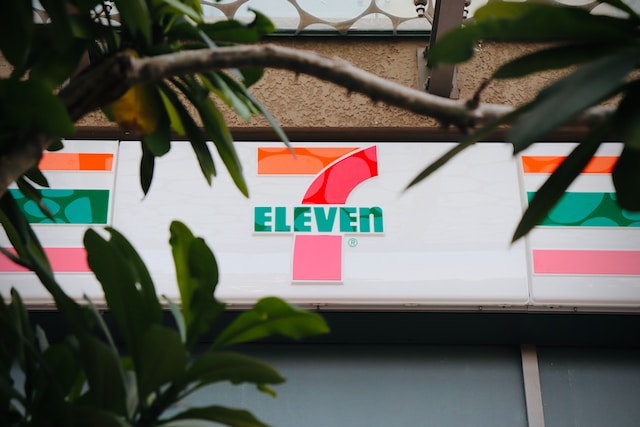Before we dive deep into the PESTEL analysis, let’s get the business overview of 7-Eleven. 7-Eleven is an international chain of convenience stores. It began operations in the 1920s and is now a subsidiary of Seven & I Holdings Co. of Japan.
7-Eleven has over 71,000 stores in 17 countries, making it the largest convenience store chain in the world. The company operates primarily on a franchise model. Many of its stores are owned and operated by independent franchisees, although some are also directly owned by the corporation.
7-Eleven stores offer a variety of products, including snacks, fresh foods, beverages, and daily necessities. They also often provide services like ATMs, fuel, and, in some regions, bill payment services.
Financial Performance 2022: According to 7-Eleven’s latest financial reports, the company earned $2.94 B, an increase over its 2021 earnings of $2.81 B.
Here is the PESTEL analysis of 7-Eleven
A PESTEL analysis is a strategic management framework used to examine the external macro-environmental factors that can impact an organization or industry. The acronym PESTEL stands for:
- Political factors: Relate to government policies, regulations, political stability, and other political forces that may impact the business environment.
- Economic factors: Deal with economic conditions and trends affecting an organization’s operations, profitability, and growth.
- Sociocultural factors: Relate to social and cultural aspects that may influence consumer preferences, lifestyles, demographics, and market trends.
- Technological factors: Deal with developing and applying new technologies, innovations, and trends that can impact an industry or organization.
- Environmental factors: Relate to ecological and environmental concerns that may affect an organization’s operations and decision-making.
- Legal factors: Refer to the laws and regulations that govern businesses and industries.
In this article, we will do a PESTEL Analysis of 7-Eleven.
PESTEL Analysis Framework: Explained with Examples
Political
- Regulations and Compliance: As a global entity, 7-Eleven operates in multiple jurisdictions and thus has to adhere to diverse regulatory landscapes. Local laws related to labor, health and safety, food standards, and franchising can affect its operations.
- Taxation Policies: Changes in taxation policies in countries where 7-Eleven operates can impact its profitability. For instance, VAT or sales tax rate changes can influence pricing and consumption patterns.
- Trade Policies: Tariffs and trade restrictions can impact the cost of goods sold in 7-Eleven stores, mainly if they import products from different countries.
- Franchise Regulations: Since 7-Eleven operates mainly on a franchise model, the political outlook on franchising, including laws and regulations specific to franchise businesses, can affect its expansion strategies.
- Licensing and Permits: In many places, 7-Eleven stores require licenses to operate 24/7. Any political decisions or local by-laws restricting operating hours can impact their business model.
- Public Health Policies: During situations like the COVID-19 pandemic, political decisions related to lockdowns, store operating restrictions, and health protocols can affect store operations.
Economic
- Economic Growth: A region’s economic prosperity influences consumers’ purchasing power. A thriving economy can increase consumer spending at convenience stores like 7-Eleven.
- Currency Exchange Rates: As an international brand, fluctuations in currency exchange rates can impact 7-Eleven’s profitability, especially when consolidating revenues from different countries.
- Inflation and Pricing: Inflation affects the cost of goods and can influence the pricing strategy of 7-Eleven. High inflation might require the company to adjust prices, impacting consumer demand.
- Unemployment Rates: High unemployment can reduce consumer spending, affecting sales. Conversely, low unemployment can boost consumer confidence and spending.
- Supply Chain Costs: Economic factors like fuel prices, labor costs, and supplier pricing can impact the cost of goods sold and the overall profitability of 7-Eleven stores.
- Real Estate Costs: Economic conditions influence real estate prices, which can affect 7-Eleven’s decisions regarding where to open new stores and at what lease terms.
- Trends in Retail and Consumption: Economic shifts can change how consumers shop. For instance, during economic downturns, consumers might prioritize convenience and proximity, benefiting local convenience stores.
Sociocultural
- Consumer Behavior: 7-Eleven must understand local buying habits, preferences, and cultural nuances to tailor its product offerings. For instance, 7-Eleven stores in Japan might offer unique snacks or meals that cater to local tastes.
- Shift Towards Convenience: In urbanized and busy societies, there’s a growing demand for quick and convenient shopping options. 7-Eleven, being a convenience store, stands to benefit from this trend.
- Local Customs and Festivities: Celebrations and local festivals can dictate product offerings. For instance, specific snacks or drinks might be in higher demand during certain celebrations.
- Demographics: Factors like age distribution, population growth, and urban migration can influence store locations and product offerings. A younger population might demand different products compared to an older demographic.
- Cultural Values: In certain regions, cultural values might influence store operations. For instance, in predominantly Muslim countries, halal certification for food products is crucial.
Technological
- Digital Payment Systems: The rise of digital wallets, contactless payments, and mobile banking has necessitated that convenience stores like 7-Eleven incorporate these payment methods.
- E-commerce and Online Delivery: With the boom of online shopping, 7-Eleven can leverage platforms or create its own for online ordering and home delivery services.
- Inventory Management: Advanced inventory systems allow 7-Eleven to track product movement, predict demand, and reduce wastage, ensuring that popular products are always in stock.
- Smart Stores: Incorporating IoT (Internet of Things) can make stores smarter. For instance, smart refrigeration can save energy, and smart shelves can provide real-time inventory data.
- Self-checkout Systems: Automated checkout kiosks can make the purchase process faster and more convenient, especially during peak hours.
- Supply Chain Optimization: Leveraging technology to optimize supply chain logistics can ensure timely stock replenishment and reduce operational costs.
Environmental
- Waste Management: Convenience stores generate a significant amount of waste, especially in terms of packaging. It’s crucial for 7-Eleven to implement effective waste reduction strategies and promote recycling.
- Energy Efficiency: 7-Eleven can focus on using energy-efficient lighting, refrigeration, and HVAC systems to reduce its carbon footprint and energy bills.
- Sustainable Sourcing: Consumers are becoming increasingly conscious about where products come from. 7-Eleven could focus on sourcing ethically produced goods derived from sustainable sources.
- Local Sourcing: By sourcing local products, 7-Eleven can reduce transportation-related emissions and support local economies.
- Reduction in Single-Use Plastics: With the global push against single-use plastics, there’s an opportunity for 7-Eleven to introduce reusable packaging or alternatives to plastics, such as biodegradable materials.
Legal
- Licensing and Regulations: As a global chain, 7-Eleven must comply with business licensing, zoning, and operational regulations specific to each country, state, or municipality in which it operates.
- Labor Laws: 7-Eleven must adhere to minimum wage laws, work hours, overtime compensation, and other labor standards across different jurisdictions.
- Franchise Agreements: A significant portion of 7-Eleven stores operate on a franchise model. Ensuring legal soundness in franchise agreements and adherence to them is critical.
- Import and Export Regulations: For goods sourced internationally, 7-Eleven must understand and abide by import/export regulations, tariffs, and customs duties.
- Real Estate and Property Laws: 7-Eleven must consider local property and land use laws when leasing or purchasing store properties.











